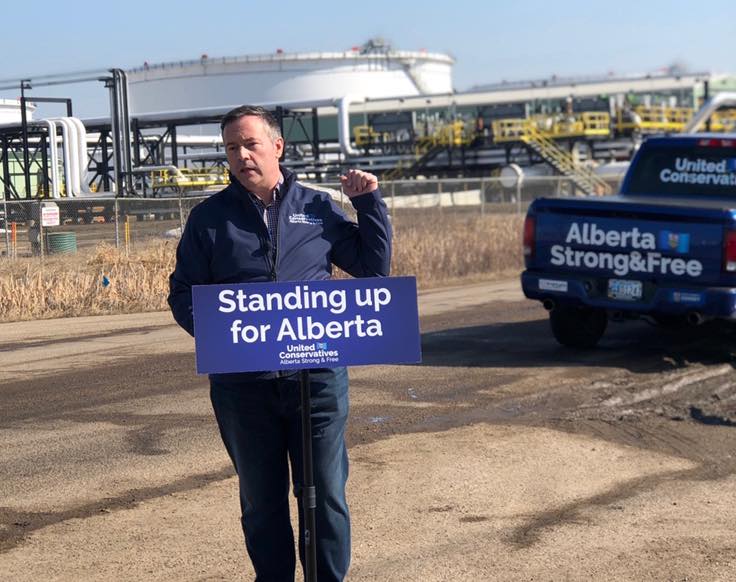The summer of 2019 will be “the summer of repeal” according to Jason Kenney, who will be sworn in as the next premier of Alberta on April 30.
The UCP leader plans to recall the legislature in May to rapidly undo the legislative program of the outgoing NDP government; particularly its Climate Leadership Plan.
At the top of the list to be repealed is an Alberta carbon tax imposed as part of a grand bargain negotiated by the NDP with representatives of the oil industry.
In return for a tax on consumers — it could have fallen entirely on Big Oil as part of an existing large-emitters carbon levy — a significant group of oil sands producers agreed to support an NDP cap on greenhouse gas (GHG) emissions.
Small oil patch operators remained generally negative.
This Alberta NDP deal initiated by outgoing premier Rachel Notley was highlighted by Prime Minister Justin Trudeau when his cabinet came down in favour of the Trans Mountain Pipeline Expansion (TMX).
Trudeau backed up his support for the NDP climate plan by buying the existing Trans Mountain pipeline that supplies the lower mainland of B.C. with gasoline for service station pumps, and was originally owned and built by B.C. Hydro.
Kenney’s gesture to repeal the carbon tax is an empty one. The federal government has a backstop in place for provinces like Ontario, Saskatchewan, Manitoba and New Brunswick, and now Alberta, that refuse consumer carbon taxes.
Undeterred, Kenney plans to join other Conservative-governed provinces contesting the constitutionality of the Ottawa power to legislate in favour of the environment.
Under its backstop law, the federal government will impose its own carbon consumption tax and then (confusingly for some) remit the proceeds to provincial consumers in the form of rebate cheques per household.
The belief shared by mainstream economists (doubters abound elsewhere) is that people will discover they are ahead of the game when they reduce consumption of carbon (to avoid paying rising taxes), and yet can go on cashing an ever-increasing federal rebate cheque.
The idea is that the dollar amounts saved by consumers for reducing carbon consumption can grow over time, working to lower GHG emissions as they do.
What is not an empty gesture and, indeed, amounts to a declaration of climate change defiance is the promise by Kenney to eliminate the cap on oil sands GHG emissions.
Environmental activists did not think much of the cap, considering it to be too high. NDP leader Rachel Notley argued that the cap gave oil sands producers incentives to reduce GHG emissions, because it would be the only way they could increase production without hitting the cap.
The oil sands production cap was only one of several NDP initiatives to reduce GHG emissions. The Notley government was investing in renewable energy. Importantly, it was imposing federal guidelines to shut down the use of coal in electricity generation by 2030.
Not only does Alberta have a substantial (50 per cent) coal-fired base for its electricity, it burns Alberta-mined coal.
Notley was prepared to take the political hit for phasing out Alberta coal production, given that coal is a “worst energy source” for GHG emissions.
As part of the summer of repeal, Kenney plans to give new life to the coal industry by ending the phase-out. Veteran Alberta journalist Graham Thomson reports that Kenney has mused about reintroducing “carbon capture and sequestration,” a $2-billion Alberta initiative from 2008 that failed to generate support and was described by former premier Jim Prentice as a science experiment.
Kenney is prepared to continue with the large-emitters carbon tax at a reduced rate. Otherwise, he makes attempts by the federal government to meet its own (inadequate) GHG reduction target and conform to the Paris Accord virtually impossible.
The Paris Climate Agreement ratified by 185 of 197 signatories expects the parties “to put forward their best efforts” and “to strengthen these efforts in the years ahead.”
Kenny is on the record as saying that given the small size of the Canadian population, any reductions in Canadian GHG emissions would be insignificant in world terms.
Without cooperation from Alberta, all the efforts made by other provinces to reduce GHG emissions would simply be filled up by Alberta oil sands and coal production.
With Kenney rejecting the idea that what Ottawa thinks is good for the climate is good for the people of Alberta, he is provoking a fight with Trudeau.
Kenney has made his intentions clear on that score. He will do whatever he can on behalf of the federal Conservatives to help them defeat Trudeau and the Liberals in the upcoming October 21 general election.
Duncan Cameron is president emeritus of rabble.ca and writes a weekly column on politics and current affairs.
Photo: Jason Kenney/Facebook
Help make rabble sustainable. Please consider supporting our work with a monthly donation. Support rabble.ca today for as little as $1 per month!




